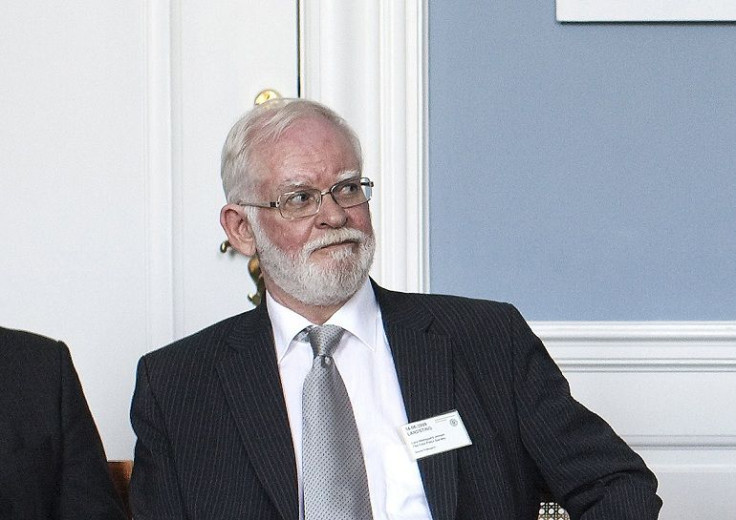The Disturbing Anonymity Of Lars Hedegaard
Opinion

Lars Hedegaard, the Danish journalist and outspoken critic of radical Islam’s political and cultural agenda, was reduced to phoning in to a TV interview recently because he’s in hiding due to threats on his life.
Hedegaard barely escaped death earlier this month when, after opening his front door, a man he later described as an Arab or Pakistani immigrant (or descendant of immigrants) of about 25, disguised as a postman, fired a bullet that barely missed his head. Though 70, the white-haired, bearded, bespectacled, and absolutely irrepressible Hedegaard responded by punching his assailant in the head and then scuffling with him before the latter fled with his gun.
That the travails of Hedegaard, who serves as president of the International Free Press Society and of Denmark’s Free Press Society, has received almost no attention from America’s mainstream media says something profoundly disturbing about how seriously we take threats to freedom across the West.
In fact, it wasn’t until this morning, when Hedegaard published his own op-ed in the Wall Street Journal, that the story appeared in any of the nation’s leading media outlets. Until then, it had been relegated to mostly conservative blogs and websites, though the liberal Huffington Post ran a piece as well.
That, in his native Denmark and across the continent, Hedegaard has been as much criticized for his inflammatory language as defended for the right to free speech that he (and everyone else) should enjoy says something even more disturbing about the moral confusion that pervades European culture.
Yes, Hedegaard is controversial. In the lead-in to the TV interview referenced above, he is shown at a podium and heard to say the following:
“The leaders of the present day Islamic onslaught on Demark and the West make no bones about their intention to eventually impose [strict Islamic] Sharia law on the infidel population and, thus, reduce Denmark’s indigenous population to a state of Dhimmitude -- that is, slaves in their own country.”
In his op-ed this morning, he chastised leftists on the continent who cozy up to “holy men who want adulterous women to be stoned, homosexuals to be hanged, apostates from Islam to be killed, and 1,200-year-old laws emanating from somewhere in the Arabian desert to replace our free constitutions.”
Hedegaard is among a small group of conservative writers who seek to speak and write openly, and protect others who do so, about the dangers that radical Islam -- or Islam itself -- presents to Western society.
Others include British columnist and author Melanie Phillips, the Henry Jackson Society’s Douglas Murray, columnist and author Diana West, author and ACT! For America President Brigitte Gabriel, writer and former federal prosecutor Andrew McCarthy, columnist and former Reagan Pentagon official Frank Gaffney, Canadian columnist and author Mark Steyn, and novelist Brad Thor.
They write not to reassure, but to awaken. They bemoan Western leaders and society for what they see as fear in the face of cultural challenge, as multiculturalism run amuck, as non-judgmental-ism that prevents well-meaning people from raising important questions about other religions and cultures.
As Phillips noted in a blog post this week, Hedegaard was tried in Denmark for hate speech and racism in 2011 after he spoke out against “child abuse and violence against women in Muslim culture.” (Though a Danish court convicted him, the Danish Supreme Court later threw out the ruling.)
Hedegaard is not the only critic of Islamic culture who’s been targeted for death in Denmark or elsewhere in Europe. In late 2004, the filmmaker Theo Van Gogh was killed by a Dutch-Moroccan Muslim after collaborating with the Somali writer and activist Ayaan Hirsi Ali on the film “Submission.”
Later, a Somali man broke into the home of Kurt Westergaard, who drew the controversial cartoons from 2005 of the prophet Mohammed for the Danish newspaper Jyllands-Posten, and almost killed him with an axe.
Meanwhile, political leaders in Denmark and elsewhere who have offended Muslim sensibilities live with police protection.
That radical Islamists turn violent in response to legitimate questions about Islamic culture, killing some and forcing others underground, is bad enough.
That the West’s leading media outlets turn tail, largely ignoring the problem or criticizing Hedegaard and others for raising legitimate issues in the first place, is hardly better.
Lawrence J. Haas, former communications director for Vice President Al Gore, is a senior fellow at the American Foreign Policy Council and author of “Sound the Trumpet: The United States and Human Rights Promotion.”
© Copyright IBTimes 2024. All rights reserved.











